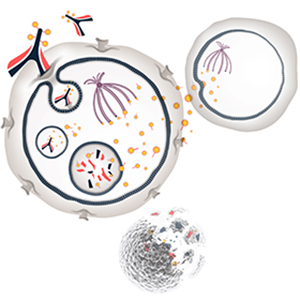
This sounds like a startup story: an innovative company is preparing to bring a product to market for the first time and hires a fast-rising young executive to help make it happen.
Except in this case, the company is 40 years old.
This past summer, 39-year-old Susan Altschuller (Ph.D. BME ’07) joined Waltham, Massachusetts-based ImmunoGen as its chief financial officer. Altschuller is a member of a leadership team tasked with preparing the company to bring a drug to market for the first time: an ovarian cancer therapy called mirvetuximab soravtansine, or “Mirv” for short.
“This company has been through a lot. And now it’s on the precipice of launching a product that makes a difference for cancer patients,” says Altschuller.
ImmunoGen has spent the last four decades developing antibody-drug conjugates (ADCs), toxins that attach to specific antibodies that lead them directly to cancer cells that they then attack. Mirv isn’t the company’s first ADC breakthrough; its technology has been licensed to other drug makers and successfully brought to market. But ImmunoGen has never brought one of its own products to market, something that will likely change if Mirv passes its stage 3 clinical trial. Mirv’s fast-track status from the United States Food and Drug Administration suggests there’s reason for optimism.
“This company has been through a lot. And now it’s on the precipice of launching a product that makes a difference for cancer patients.”
—Susan Altschuller
Altschuller’s rapid ascent to life sciences CFO began at Illinois Institute of Technology, where she studied biomedical engineering under Vincent Turitto, emeritus professor and first director of the Pritzker Institute of Biomedical Engineering, and also grew interested in the business side of biotech. A native of the Chicago suburb of Western Springs, Altschuller came home to attend graduate school after earning her bachelor’s degree at Tulane University in New Orleans. While at Illinois Tech, she participated in a life-sciences incubator sponsored by the Illinois Biotechnology Innovation Organization, and “I realized that I wanted to be at the intersection of science and business,” she says.
After completing her doctorate, Altschuller moved to Boston and earned an M.B.A. at Massachusetts Institute of Technology. She stayed in the area after graduation, working in investor relations at a series of biotech firms, while setting her sights on a CFO role at a company she believed was poised for success. ImmunoGen checked all the boxes, in terms of both science and also corporate structure. She even looked into Mirv, relying on her biomedical engineering chops to satisfy herself that a 2019 clinical trial setback was just a speedbump, and that the kinks had been worked out. Her ability to evaluate Mirv’s status also impressed the ImmunoGen team.
“That scientific curiosity and aptitude is very helpful,” says Audrey Bergan, senior vice president at ImmunoGen. “For a CFO to have that genuine interest in the science will only make her more understanding of the business.”
The timing of Altschuller’s hire, however, has made for a challenging transition. She joined ImmunoGen in July, in the midst of the COVID-19 pandemic, making it difficult to build rapport with her new team.
“You don’t have the same hallway conversations that you would normally have, so I’ve been trying to be more proactive about informal outreach—texting people, calling people,” Altschuller says, noting that one of her go-to strategies for quarantine leadership is what she calls the “walk and talk,” meetings where she ditches video calling in favor of heading outside for a conversation and a stroll around the block.
Altschuller is acclimating while also trying to position her team for a critical 2021. ImmunoGen expects results on Mirv’s phase 3 trial in the third quarter of next year, results that will set the course for ImmunoGen’s future.
“As a leader, I need to be thoughtful about how we build the business for the long term, whether that’s in the context of [Mirv’s] success or failure,” Altschuller says. “In the face of failure, we have other great assets we could use to build the company. But the options before us in the face of success are profound—we could build a great oncology company here, and that’s what I think is going to happen.”
